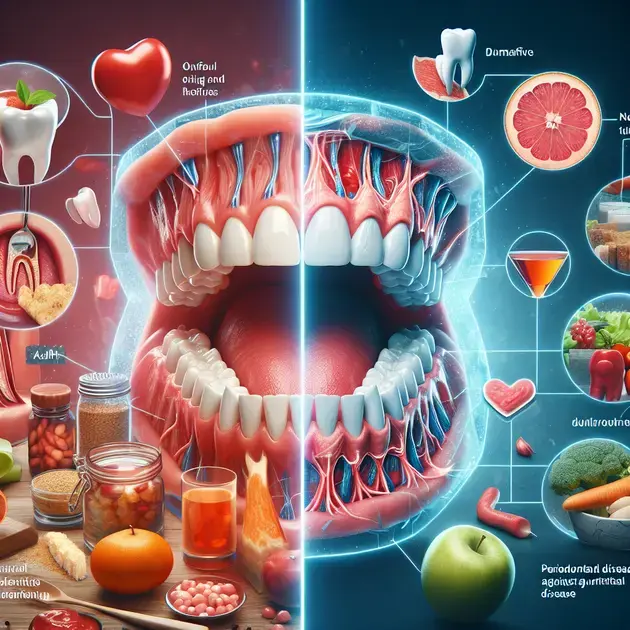When it comes to combating periodontitis, having access to effective medication is crucial for a successful treatment journey. This comprehensive guide aims to provide you with all the information you need to navigate the world of medications specifically designed to address periodontal disease.
Periodontitis, a serious gum infection that damages the soft tissue and destroys the bone that supports your teeth, requires a multi-faceted approach to treatment. In this guide, we will explore the various medications available to help manage and control the progression of periodontitis, ultimately leading to improved oral health outcomes.

Effective Medication for Periodontitis: Types of Medications Available
Periodontitis is a serious gum infection that damages the soft tissue and destroys the bone that supports your teeth. To effectively treat periodontitis, various types of medications are available that can help in combating the infection and promoting gum health. Here are some common types of medications used for periodontitis treatment:
1. Antibiotics:
In cases of advanced periodontitis, antibiotics may be prescribed to help eliminate the bacteria causing the infection. Antibiotics can be taken orally or applied directly to the infected areas. Common antibiotics used for periodontitis include doxycycline, metronidazole, and minocycline.
2. Antiseptic Mouthwash:
Antiseptic mouthwashes are helpful in reducing plaque and bacteria in the mouth. They can be used as an adjunct to regular brushing and flossing to help control the progression of periodontitis. Popular antiseptic mouthwashes like Listerine and Chlorhexidine are recommended for periodontal care.
3. Enzyme Suppressants:
Enzyme suppressants are medications that help inhibit the enzymes responsible for the breakdown of gum tissue. By using enzyme suppressants, the progression of periodontitis can be slowed down, giving the gums a chance to heal. A common enzyme suppressant used in periodontal treatment is Periostat.
4. Pain Relievers:
For individuals experiencing pain and discomfort due to periodontitis, pain relievers such as ibuprofen or acetaminophen may be recommended. These medications can help alleviate the symptoms temporarily while the primary treatment focuses on addressing the underlying infection.
When considering medication for periodontitis treatment, it is essential to consult with a dental professional to determine the most suitable option based on your specific condition and medical history.
Understanding the Benefits of Using Medications for Periodontitis
Medications play a crucial role in the treatment of periodontitis by targeting the bacteria causing the infection and aiding in the healing process of the gums. Understanding the benefits of using medications for periodontitis can help individuals make informed decisions about their oral health. Here are some advantages of using medications for periodontitis:
1. Targeted Bacterial Elimination:
Medications such as antibiotics directly target the bacteria responsible for periodontal infection, helping to reduce inflammation and promote gum healing. By eradicating harmful bacteria, medications can prevent the progression of periodontitis and save the affected teeth.
2. Reduced Inflammation:
Anti-inflammatory medications prescribed for periodontitis aid in reducing gum inflammation, swelling, and tenderness. By controlling inflammation, medications can alleviate pain and discomfort associated with the infection, improving the overall oral health and well-being of the individual.
3. Enhanced Healing Process:
Medications like enzyme suppressants support the healing process of the damaged gum tissue by slowing down the enzymes responsible for tissue breakdown. This allows the gums to regenerate and repair, leading to improved periodontal health and decreased risk of further complications.
4. Symptom Management:
Using medications for periodontitis can help manage symptoms such as bleeding gums, bad breath, and tooth sensitivity. By addressing these symptoms, individuals can experience relief and better oral hygiene, paving the way for successful periodontal treatment outcomes.
Overall, the benefits of using medications for periodontitis are significant in combating the infection, promoting gum health, and restoring the overall oral well-being of individuals suffering from this condition.
Tips for Choosing the Right Medication for Your Periodontitis Treatment
When selecting the appropriate medication for your periodontitis treatment, it is essential to consider various factors to ensure optimal effectiveness and minimal side effects. Here are some tips to help you choose the right medication for your periodontitis:
1. Consultation with a Dental Professional:
Prior to starting any medication for periodontitis, schedule a consultation with a dental professional to evaluate your condition and determine the most suitable treatment plan. Your dentist or periodontist can recommend the best medication based on their assessment and expertise.
2. Consideration of Medication Type:
Understand the different types of medications available for periodontitis, such as antibiotics, antiseptic mouthwashes, enzyme suppressants, and pain relievers. Based on the severity of your condition and treatment goals, your healthcare provider can suggest the most appropriate medication for you.
3. Individual Health Factors:
Take into account your individual health factors, including any medical conditions, allergies, or medications you are currently taking. Some medications for periodontitis may interact with existing medications or health conditions, so it is crucial to inform your healthcare provider of your complete medical history.
4. Adherence to Treatment Plan:
Follow the prescribed treatment plan diligently and adhere to the recommended dosage and duration of medication intake. Consistent use of medication as directed by your dental professional is essential to achieve positive treatment outcomes and effectively manage periodontitis.
5. Monitor and Report Side Effects:
Be vigilant in monitoring any side effects or adverse reactions to the medication and promptly report them to your healthcare provider. By staying proactive in addressing any concerns or complications, adjustments can be made to your treatment plan to ensure your safety and comfort.

**Understanding the Importance of Oral Health Maintenance**
Introduction
Oral health maintenance is crucial for overall well-being. Regular dental check-ups, proper brushing and flossing techniques, and a balanced diet are essential in preventing various oral health issues such as cavities, gum disease, and bad breath.
Regular Dental Check-ups
Scheduling regular dental check-ups at least twice a year is important to detect any oral health problems early on. During these check-ups, the dentist can perform a thorough examination of your teeth and gums, identify any areas of concern, and provide appropriate treatment to prevent further complications.
Proper Brushing and Flossing Techniques
Brushing your teeth at least twice a day and flossing daily helps remove plaque and food particles that can lead to tooth decay and gum disease. Using the right brushing technique and the right type of toothbrush and floss are essential for maintaining good oral hygiene.
Importance of a Balanced Diet
Your diet plays a significant role in your oral health. Consuming a diet rich in fruits, vegetables, lean proteins, and dairy products can help strengthen your teeth and gums. Avoiding sugary and acidic foods and drinks can prevent tooth decay and erosion.
Conclusion
Overall, understanding the importance of oral health maintenance and following a proper oral hygiene routine can help you maintain a healthy smile for years to come. By incorporating regular dental check-ups, proper brushing and flossing techniques, and a balanced diet into your lifestyle, you can prevent oral health issues and enjoy a confident smile.
**Exploring Common Myths About Gum Disease**
Introduction
Gum disease, also known as periodontal disease, is a common oral health condition that can lead to serious complications if left untreated. There are several myths surrounding gum disease that may prevent individuals from seeking timely treatment and taking necessary precautions to prevent its progression.
Myth #1: Gum Disease Only Affects Older Adults
Contrary to popular belief, gum disease can affect individuals of all ages, including children and young adults. Poor oral hygiene, genetic predisposition, and certain health conditions can increase the risk of developing gum disease at any stage of life.
Myth #2: Bleeding Gums Are Normal
Many people believe that bleeding gums while brushing or flossing is normal. In reality, bleeding gums are usually a sign of gum inflammation, known as gingivitis, which can progress to gum disease if not addressed promptly. Ignoring bleeding gums can lead to further oral health complications.
Myth #3: Gum Disease Is Untreatable
Another common myth is that once gum disease sets in, it is impossible to treat. In fact, early detection and intervention can help reverse the effects of gum disease and prevent its progression. Dental professionals can recommend appropriate treatments, including deep cleanings and medications, to manage gum disease effectively.
Conclusion
By debunking common myths about gum disease and educating yourself about the importance of maintaining good oral hygiene practices, you can protect your gums and overall oral health. Seeking regular dental care, practicing proper oral hygiene, and being aware of the signs and symptoms of gum disease can help you prevent this prevalent oral health condition.
**The Connection Between Diet and Periodontal Health**
Introduction
The relationship between diet and periodontal health is significant, as the foods we consume can impact the health of our gums and teeth. A balanced diet rich in essential nutrients contributes to strong teeth and gums, while poor dietary choices can increase the risk of developing periodontal disease.
Impact of Sugary Foods and Beverages
Consuming excessive amounts of sugary foods and beverages can contribute to the growth of harmful bacteria in the mouth, leading to plaque buildup and tooth decay. Limiting the intake of sugary snacks and drinks can help prevent cavities and maintain optimal periodontal health.
Role of Vitamin C in Gum Health
Vitamin C plays a crucial role in supporting gum health and preventing gum disease. Incorporating vitamin C-rich foods such as citrus fruits, strawberries, and bell peppers into your diet can help strengthen the gums, reduce inflammation, and promote overall periodontal health.
Importance of Calcium and Vitamin D
Calcium and vitamin D are essential nutrients for maintaining strong teeth and bones. Adequate intake of calcium-rich foods like dairy products and leafy greens, along with exposure to sunlight for vitamin D synthesis, can help prevent bone loss in the jaw and reduce the risk of periodontal disease.
Conclusion
By understanding the connection between diet and periodontal health, you can make informed dietary choices that support your oral health. A nutritious diet, combined with good oral hygiene practices and regular dental check-ups, can help prevent gum disease, promote gum health, and preserve your smile for years to come.
Conclusion
Understanding the significance of oral health maintenance is vital for ensuring overall well-being. By prioritizing regular dental check-ups, proper brushing and flossing techniques, and a balanced diet, individuals can effectively prevent oral health issues such as cavities, gum disease, and bad breath.
Importance of Preventive Measures
Embracing preventive measures like scheduling bi-annual dental check-ups enables early detection of oral health problems, facilitating timely treatment to avoid complications. This proactive approach is key to maintaining optimal oral hygiene and preserving a healthy smile for years to come.
Educating Against Misconceptions
Dispelling myths about gum disease, such as the misconception that it only affects older adults or that it is untreatable, is crucial. By educating oneself and seeking regular dental care, individuals can protect their gums, address gum inflammation promptly, and manage gum disease effectively with appropriate treatments.
Empowering Through Dietary Awareness
Awareness of the connection between diet and periodontal health empowers individuals to make informed dietary choices. Incorporating nutrient-rich foods, limiting sugary snacks and beverages, and ensuring adequate intake of vitamin C, calcium, and vitamin D can promote gum health, prevent gum disease, and contribute to maintaining a vibrant smile.



